Criminal Psychology Essay: Consent to Searches by Law Enforcement
VerifiedAdded on 2022/08/14
|6
|1470
|13
Essay
AI Summary
This essay delves into the critical area of consent searches within criminal psychology, focusing on the Fourth Amendment's protections against unreasonable searches and seizures. It explores the reasons individuals consent to searches, often influenced by perceptions of authority and the desire to avoid conflict with law enforcement, particularly during traffic stops. The essay examines factors leading to consent, such as the officer's demeanor and the citizen's feeling of being intimidated, and analyzes the social science perspective on the context of interactions between police and citizens. It highlights the importance of understanding one's rights, including the right to refuse consent, and discusses the legal boundaries of police actions, such as the requirement for warrants and the limitations on frisking. The essay emphasizes the potential for abuse of power and the need for citizens to be aware of their constitutional safeguards.
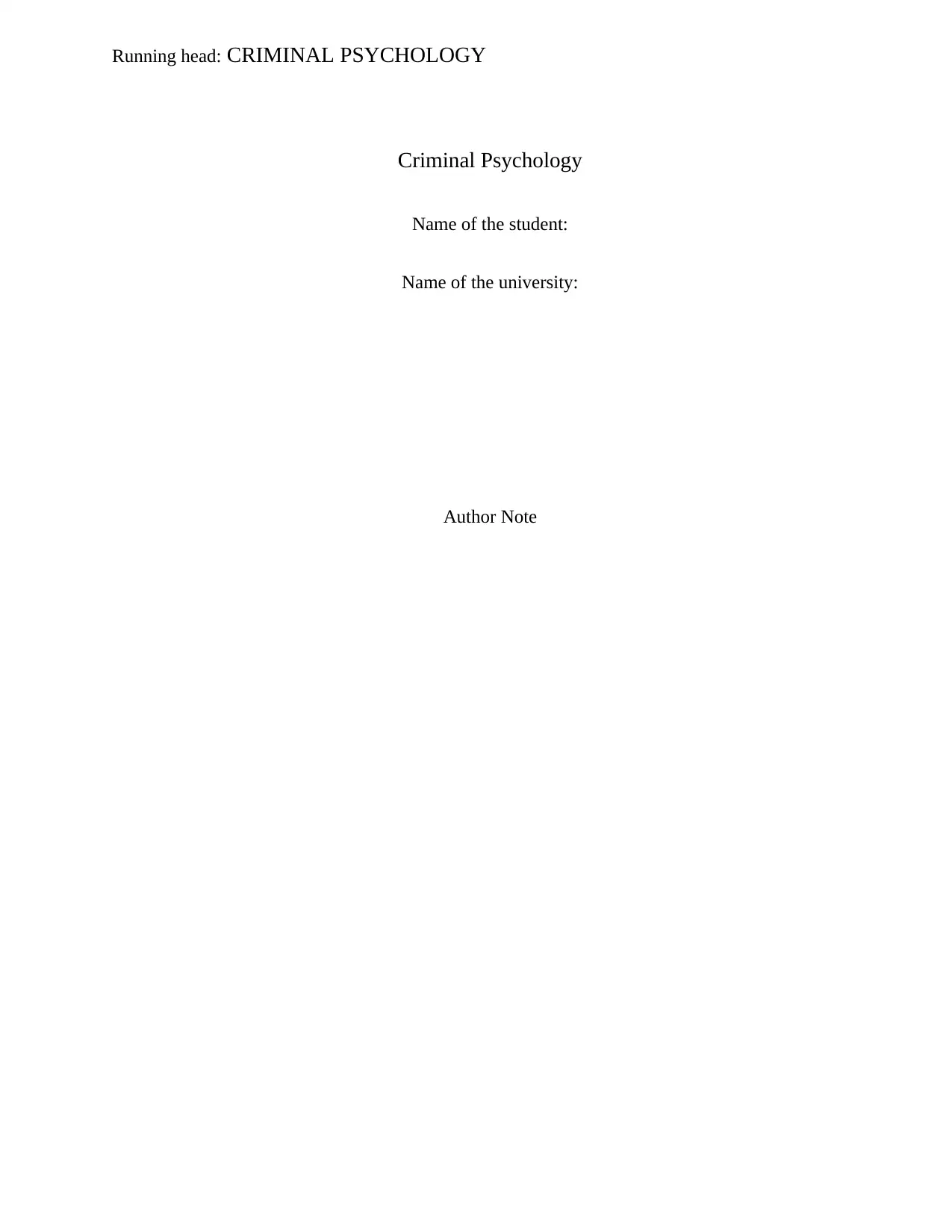
Running head: CRIMINAL PSYCHOLOGY
Criminal Psychology
Name of the student:
Name of the university:
Author Note
Criminal Psychology
Name of the student:
Name of the university:
Author Note
Paraphrase This Document
Need a fresh take? Get an instant paraphrase of this document with our AI Paraphraser
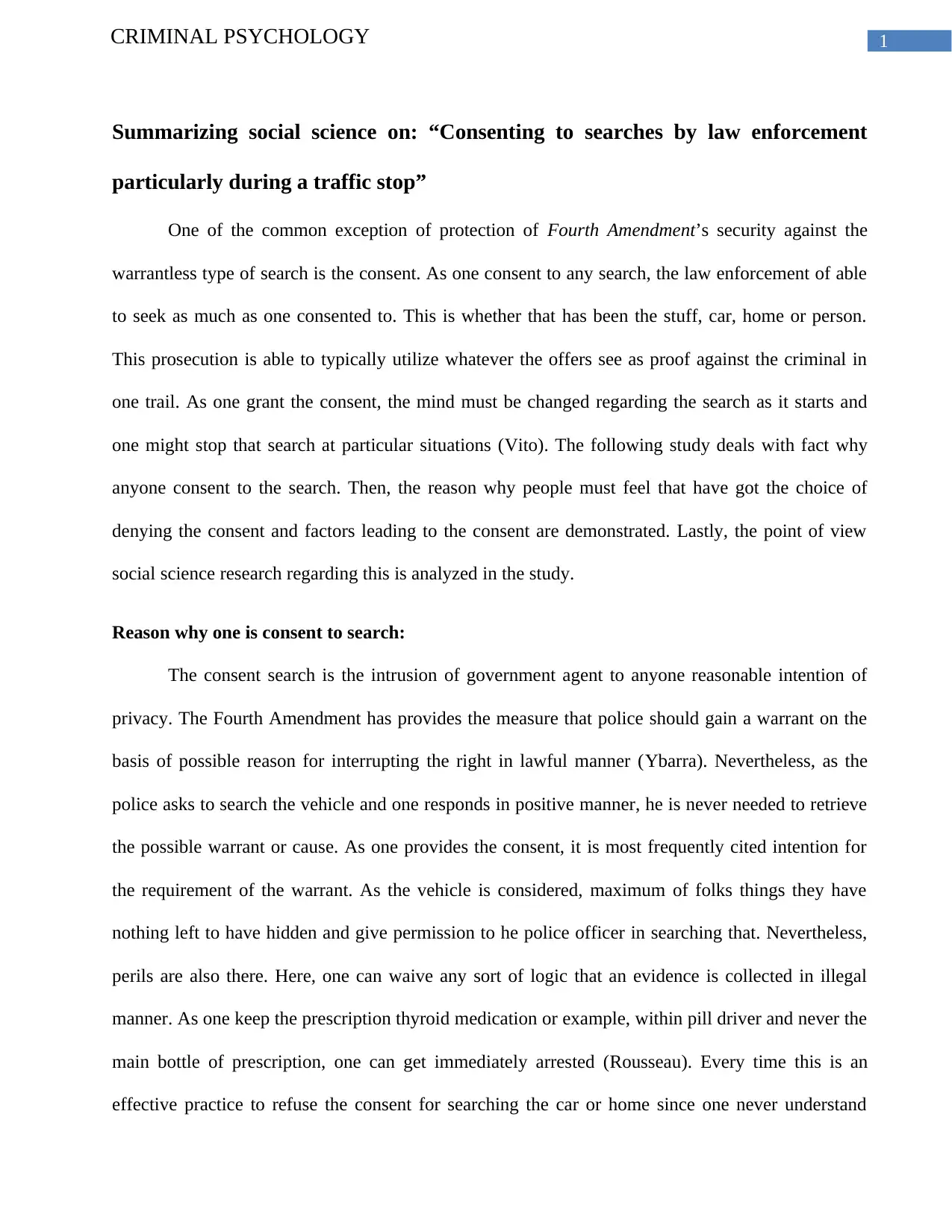
1CRIMINAL PSYCHOLOGY
Summarizing social science on: “Consenting to searches by law enforcement
particularly during a traffic stop”
One of the common exception of protection of Fourth Amendment’s security against the
warrantless type of search is the consent. As one consent to any search, the law enforcement of able
to seek as much as one consented to. This is whether that has been the stuff, car, home or person.
This prosecution is able to typically utilize whatever the offers see as proof against the criminal in
one trail. As one grant the consent, the mind must be changed regarding the search as it starts and
one might stop that search at particular situations (Vito). The following study deals with fact why
anyone consent to the search. Then, the reason why people must feel that have got the choice of
denying the consent and factors leading to the consent are demonstrated. Lastly, the point of view
social science research regarding this is analyzed in the study.
Reason why one is consent to search:
The consent search is the intrusion of government agent to anyone reasonable intention of
privacy. The Fourth Amendment has provides the measure that police should gain a warrant on the
basis of possible reason for interrupting the right in lawful manner (Ybarra). Nevertheless, as the
police asks to search the vehicle and one responds in positive manner, he is never needed to retrieve
the possible warrant or cause. As one provides the consent, it is most frequently cited intention for
the requirement of the warrant. As the vehicle is considered, maximum of folks things they have
nothing left to have hidden and give permission to he police officer in searching that. Nevertheless,
perils are also there. Here, one can waive any sort of logic that an evidence is collected in illegal
manner. As one keep the prescription thyroid medication or example, within pill driver and never the
main bottle of prescription, one can get immediately arrested (Rousseau). Every time this is an
effective practice to refuse the consent for searching the car or home since one never understand
Summarizing social science on: “Consenting to searches by law enforcement
particularly during a traffic stop”
One of the common exception of protection of Fourth Amendment’s security against the
warrantless type of search is the consent. As one consent to any search, the law enforcement of able
to seek as much as one consented to. This is whether that has been the stuff, car, home or person.
This prosecution is able to typically utilize whatever the offers see as proof against the criminal in
one trail. As one grant the consent, the mind must be changed regarding the search as it starts and
one might stop that search at particular situations (Vito). The following study deals with fact why
anyone consent to the search. Then, the reason why people must feel that have got the choice of
denying the consent and factors leading to the consent are demonstrated. Lastly, the point of view
social science research regarding this is analyzed in the study.
Reason why one is consent to search:
The consent search is the intrusion of government agent to anyone reasonable intention of
privacy. The Fourth Amendment has provides the measure that police should gain a warrant on the
basis of possible reason for interrupting the right in lawful manner (Ybarra). Nevertheless, as the
police asks to search the vehicle and one responds in positive manner, he is never needed to retrieve
the possible warrant or cause. As one provides the consent, it is most frequently cited intention for
the requirement of the warrant. As the vehicle is considered, maximum of folks things they have
nothing left to have hidden and give permission to he police officer in searching that. Nevertheless,
perils are also there. Here, one can waive any sort of logic that an evidence is collected in illegal
manner. As one keep the prescription thyroid medication or example, within pill driver and never the
main bottle of prescription, one can get immediately arrested (Rousseau). Every time this is an
effective practice to refuse the consent for searching the car or home since one never understand
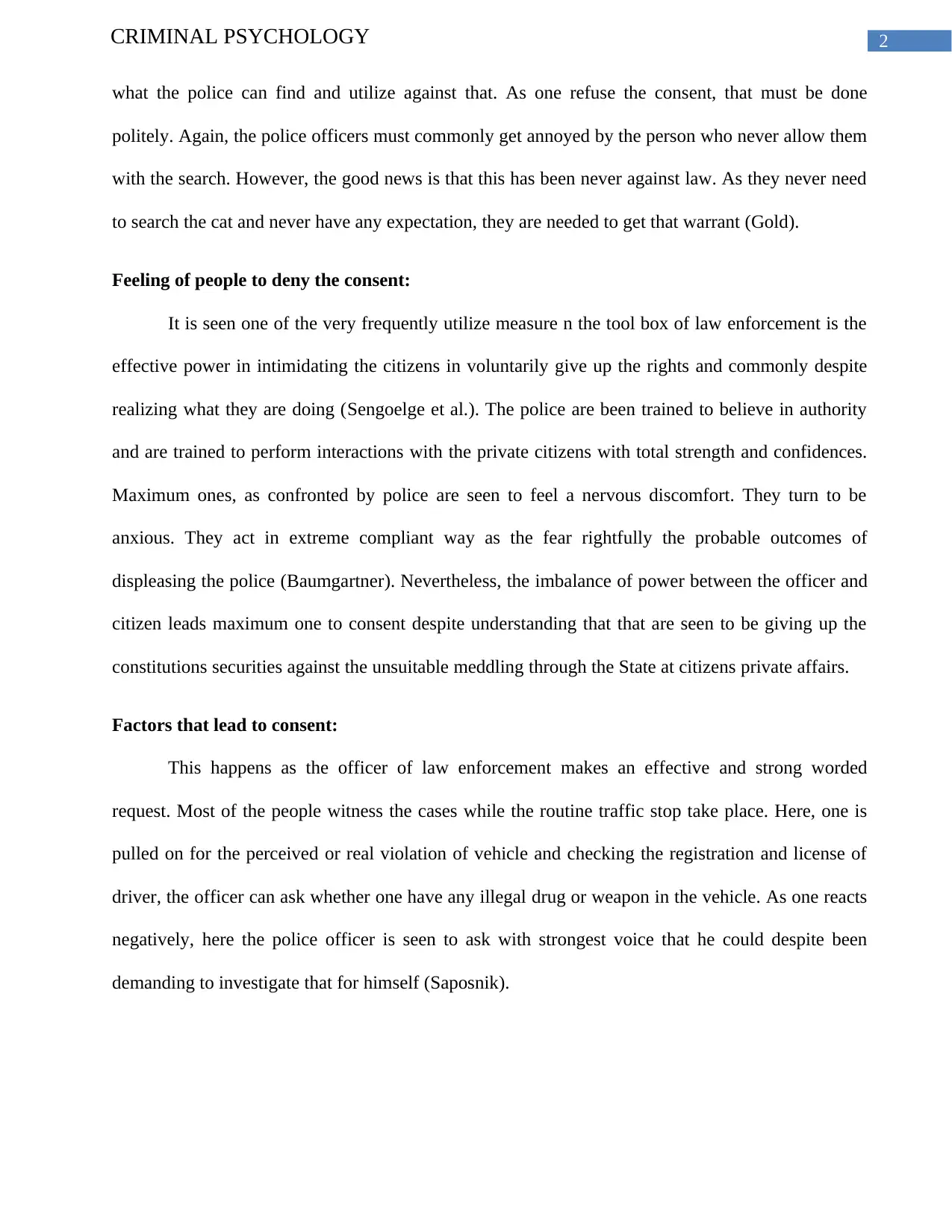
2CRIMINAL PSYCHOLOGY
what the police can find and utilize against that. As one refuse the consent, that must be done
politely. Again, the police officers must commonly get annoyed by the person who never allow them
with the search. However, the good news is that this has been never against law. As they never need
to search the cat and never have any expectation, they are needed to get that warrant (Gold).
Feeling of people to deny the consent:
It is seen one of the very frequently utilize measure n the tool box of law enforcement is the
effective power in intimidating the citizens in voluntarily give up the rights and commonly despite
realizing what they are doing (Sengoelge et al.). The police are been trained to believe in authority
and are trained to perform interactions with the private citizens with total strength and confidences.
Maximum ones, as confronted by police are seen to feel a nervous discomfort. They turn to be
anxious. They act in extreme compliant way as the fear rightfully the probable outcomes of
displeasing the police (Baumgartner). Nevertheless, the imbalance of power between the officer and
citizen leads maximum one to consent despite understanding that that are seen to be giving up the
constitutions securities against the unsuitable meddling through the State at citizens private affairs.
Factors that lead to consent:
This happens as the officer of law enforcement makes an effective and strong worded
request. Most of the people witness the cases while the routine traffic stop take place. Here, one is
pulled on for the perceived or real violation of vehicle and checking the registration and license of
driver, the officer can ask whether one have any illegal drug or weapon in the vehicle. As one reacts
negatively, here the police officer is seen to ask with strongest voice that he could despite been
demanding to investigate that for himself (Saposnik).
what the police can find and utilize against that. As one refuse the consent, that must be done
politely. Again, the police officers must commonly get annoyed by the person who never allow them
with the search. However, the good news is that this has been never against law. As they never need
to search the cat and never have any expectation, they are needed to get that warrant (Gold).
Feeling of people to deny the consent:
It is seen one of the very frequently utilize measure n the tool box of law enforcement is the
effective power in intimidating the citizens in voluntarily give up the rights and commonly despite
realizing what they are doing (Sengoelge et al.). The police are been trained to believe in authority
and are trained to perform interactions with the private citizens with total strength and confidences.
Maximum ones, as confronted by police are seen to feel a nervous discomfort. They turn to be
anxious. They act in extreme compliant way as the fear rightfully the probable outcomes of
displeasing the police (Baumgartner). Nevertheless, the imbalance of power between the officer and
citizen leads maximum one to consent despite understanding that that are seen to be giving up the
constitutions securities against the unsuitable meddling through the State at citizens private affairs.
Factors that lead to consent:
This happens as the officer of law enforcement makes an effective and strong worded
request. Most of the people witness the cases while the routine traffic stop take place. Here, one is
pulled on for the perceived or real violation of vehicle and checking the registration and license of
driver, the officer can ask whether one have any illegal drug or weapon in the vehicle. As one reacts
negatively, here the police officer is seen to ask with strongest voice that he could despite been
demanding to investigate that for himself (Saposnik).
⊘ This is a preview!⊘
Do you want full access?
Subscribe today to unlock all pages.

Trusted by 1+ million students worldwide
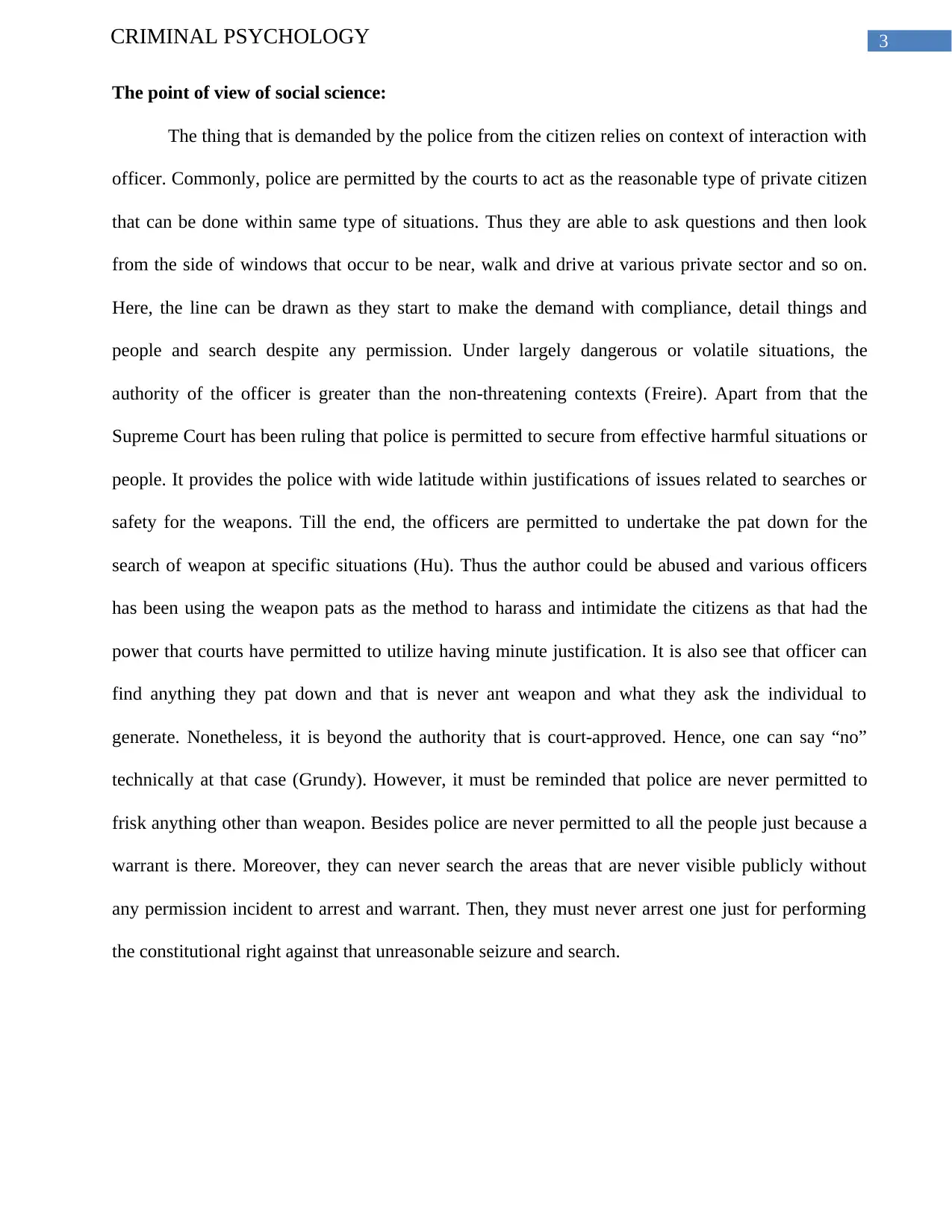
3CRIMINAL PSYCHOLOGY
The point of view of social science:
The thing that is demanded by the police from the citizen relies on context of interaction with
officer. Commonly, police are permitted by the courts to act as the reasonable type of private citizen
that can be done within same type of situations. Thus they are able to ask questions and then look
from the side of windows that occur to be near, walk and drive at various private sector and so on.
Here, the line can be drawn as they start to make the demand with compliance, detail things and
people and search despite any permission. Under largely dangerous or volatile situations, the
authority of the officer is greater than the non-threatening contexts (Freire). Apart from that the
Supreme Court has been ruling that police is permitted to secure from effective harmful situations or
people. It provides the police with wide latitude within justifications of issues related to searches or
safety for the weapons. Till the end, the officers are permitted to undertake the pat down for the
search of weapon at specific situations (Hu). Thus the author could be abused and various officers
has been using the weapon pats as the method to harass and intimidate the citizens as that had the
power that courts have permitted to utilize having minute justification. It is also see that officer can
find anything they pat down and that is never ant weapon and what they ask the individual to
generate. Nonetheless, it is beyond the authority that is court-approved. Hence, one can say “no”
technically at that case (Grundy). However, it must be reminded that police are never permitted to
frisk anything other than weapon. Besides police are never permitted to all the people just because a
warrant is there. Moreover, they can never search the areas that are never visible publicly without
any permission incident to arrest and warrant. Then, they must never arrest one just for performing
the constitutional right against that unreasonable seizure and search.
The point of view of social science:
The thing that is demanded by the police from the citizen relies on context of interaction with
officer. Commonly, police are permitted by the courts to act as the reasonable type of private citizen
that can be done within same type of situations. Thus they are able to ask questions and then look
from the side of windows that occur to be near, walk and drive at various private sector and so on.
Here, the line can be drawn as they start to make the demand with compliance, detail things and
people and search despite any permission. Under largely dangerous or volatile situations, the
authority of the officer is greater than the non-threatening contexts (Freire). Apart from that the
Supreme Court has been ruling that police is permitted to secure from effective harmful situations or
people. It provides the police with wide latitude within justifications of issues related to searches or
safety for the weapons. Till the end, the officers are permitted to undertake the pat down for the
search of weapon at specific situations (Hu). Thus the author could be abused and various officers
has been using the weapon pats as the method to harass and intimidate the citizens as that had the
power that courts have permitted to utilize having minute justification. It is also see that officer can
find anything they pat down and that is never ant weapon and what they ask the individual to
generate. Nonetheless, it is beyond the authority that is court-approved. Hence, one can say “no”
technically at that case (Grundy). However, it must be reminded that police are never permitted to
frisk anything other than weapon. Besides police are never permitted to all the people just because a
warrant is there. Moreover, they can never search the areas that are never visible publicly without
any permission incident to arrest and warrant. Then, they must never arrest one just for performing
the constitutional right against that unreasonable seizure and search.
Paraphrase This Document
Need a fresh take? Get an instant paraphrase of this document with our AI Paraphraser
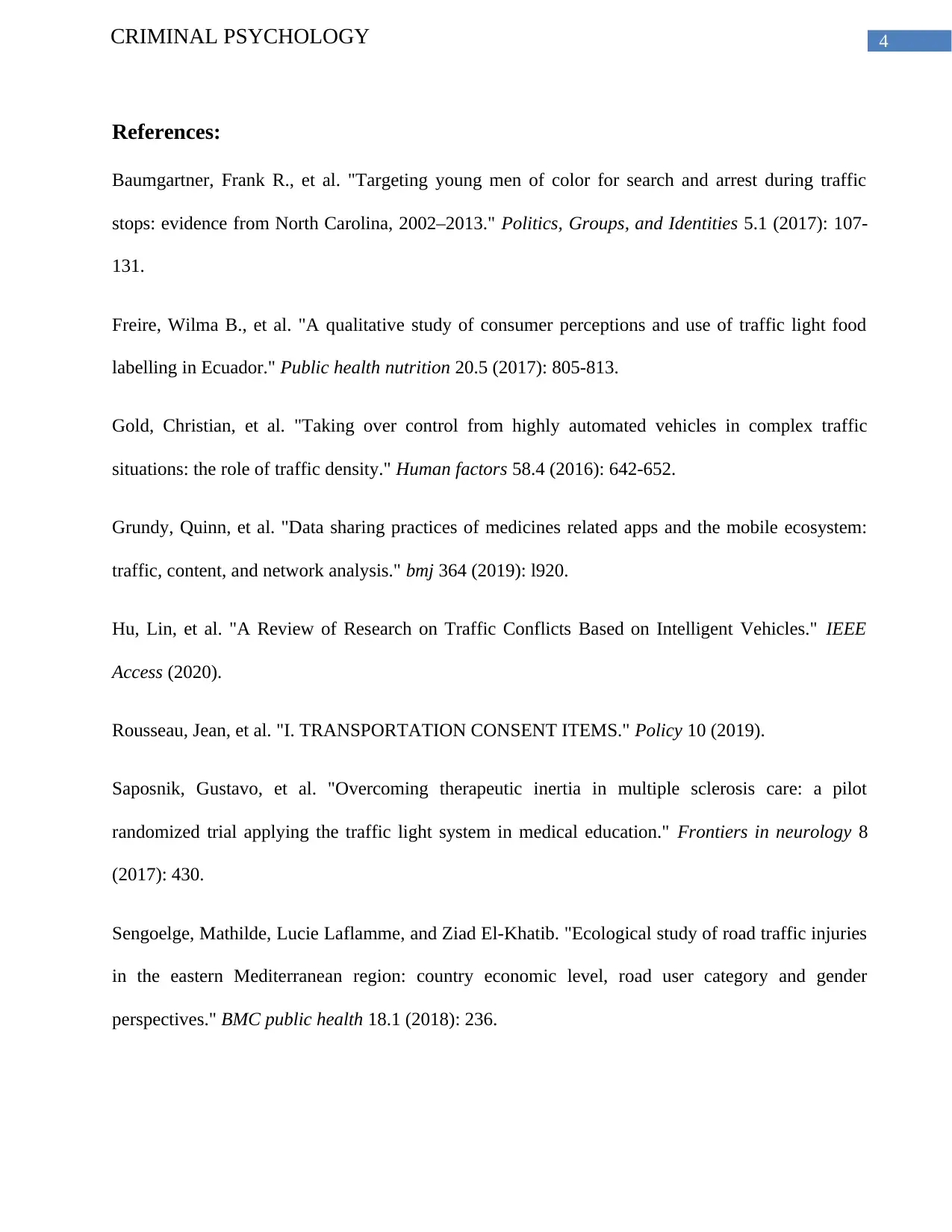
4CRIMINAL PSYCHOLOGY
References:
Baumgartner, Frank R., et al. "Targeting young men of color for search and arrest during traffic
stops: evidence from North Carolina, 2002–2013." Politics, Groups, and Identities 5.1 (2017): 107-
131.
Freire, Wilma B., et al. "A qualitative study of consumer perceptions and use of traffic light food
labelling in Ecuador." Public health nutrition 20.5 (2017): 805-813.
Gold, Christian, et al. "Taking over control from highly automated vehicles in complex traffic
situations: the role of traffic density." Human factors 58.4 (2016): 642-652.
Grundy, Quinn, et al. "Data sharing practices of medicines related apps and the mobile ecosystem:
traffic, content, and network analysis." bmj 364 (2019): l920.
Hu, Lin, et al. "A Review of Research on Traffic Conflicts Based on Intelligent Vehicles." IEEE
Access (2020).
Rousseau, Jean, et al. "I. TRANSPORTATION CONSENT ITEMS." Policy 10 (2019).
Saposnik, Gustavo, et al. "Overcoming therapeutic inertia in multiple sclerosis care: a pilot
randomized trial applying the traffic light system in medical education." Frontiers in neurology 8
(2017): 430.
Sengoelge, Mathilde, Lucie Laflamme, and Ziad El-Khatib. "Ecological study of road traffic injuries
in the eastern Mediterranean region: country economic level, road user category and gender
perspectives." BMC public health 18.1 (2018): 236.
References:
Baumgartner, Frank R., et al. "Targeting young men of color for search and arrest during traffic
stops: evidence from North Carolina, 2002–2013." Politics, Groups, and Identities 5.1 (2017): 107-
131.
Freire, Wilma B., et al. "A qualitative study of consumer perceptions and use of traffic light food
labelling in Ecuador." Public health nutrition 20.5 (2017): 805-813.
Gold, Christian, et al. "Taking over control from highly automated vehicles in complex traffic
situations: the role of traffic density." Human factors 58.4 (2016): 642-652.
Grundy, Quinn, et al. "Data sharing practices of medicines related apps and the mobile ecosystem:
traffic, content, and network analysis." bmj 364 (2019): l920.
Hu, Lin, et al. "A Review of Research on Traffic Conflicts Based on Intelligent Vehicles." IEEE
Access (2020).
Rousseau, Jean, et al. "I. TRANSPORTATION CONSENT ITEMS." Policy 10 (2019).
Saposnik, Gustavo, et al. "Overcoming therapeutic inertia in multiple sclerosis care: a pilot
randomized trial applying the traffic light system in medical education." Frontiers in neurology 8
(2017): 430.
Sengoelge, Mathilde, Lucie Laflamme, and Ziad El-Khatib. "Ecological study of road traffic injuries
in the eastern Mediterranean region: country economic level, road user category and gender
perspectives." BMC public health 18.1 (2018): 236.

5CRIMINAL PSYCHOLOGY
Vito, Anthony G., et al. "Consent searches: understanding the role of race and what occurs during
the traffic stop." Policing: An International Journal (2019).
Ybarra, Ornaldo. "Consent Decrees." (2018).
Vito, Anthony G., et al. "Consent searches: understanding the role of race and what occurs during
the traffic stop." Policing: An International Journal (2019).
Ybarra, Ornaldo. "Consent Decrees." (2018).
⊘ This is a preview!⊘
Do you want full access?
Subscribe today to unlock all pages.

Trusted by 1+ million students worldwide
1 out of 6
Your All-in-One AI-Powered Toolkit for Academic Success.
+13062052269
info@desklib.com
Available 24*7 on WhatsApp / Email
![[object Object]](/_next/static/media/star-bottom.7253800d.svg)
Unlock your academic potential
Copyright © 2020–2025 A2Z Services. All Rights Reserved. Developed and managed by ZUCOL.


